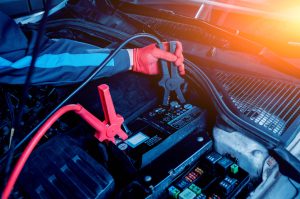
A weak battery can easily fail, and you could be stuck waiting for a jump-start. As your Lincoln dealer, we don’t want this to ever happen to you. These are a few signs that your battery could be failing, and you need to visit us for a new car battery before it does.
Damaged Alternator
Your battery supplies a significant portion of its stored electricity to power the starter, which then cranks the engine. Once the engine is running, the alternator begins recharging the battery. It charges at full power for ten minutes and then switches to recharging at 10% of battery capacity until the battery is fully charged. The reduced recharging rate protects the battery from damage.
If your alternator is damaged, it may not reduce the recharging rate. In this situation, the alternator will continue charging the battery at full power, and the battery’s electrolyte solution will boil. You’ll smell a sulfurous stench from the engine as this happens. We’ll replace the damaged alternator, and test your battery to determine if it’s still in good condition. If necessary, we’ll install a new battery.
Check Battery Light
The check battery light illuminates as a warning that something is wrong with the electrical system. Sensors are connected to all electrical system components and are sensitive enough to identify the slightest change in their connected component’s behavior. If this happens, the sensors will inform your computer, which lights the check battery light.
A more damaged battery can trigger this light if its sensors identify a drop in battery voltage. Damaged wiring and loose battery connectors can also cause this light to illuminate, as these issues affect the battery’s ability to supply a charge and recharge. Our technicians will examine your electrical system, find the cause of the trouble, and repair it.
Corroded Terminals
Corrosion appears as a white, green, or gray salt-like substance that collects around the terminals. It’s also a sign that your battery is in trouble. The corrosion is caused by hydrogen sulfide. Sulfuric acid in the battery gradually breaks down and releases hydrogen gas as it does so. The hydrogen escapes the battery casing and joins with sulfur molecules in your engine to form hydrogen sulfide.
Hydrogen gas is only released towards the end of the chemical breakdown process, so its presence means your battery is close to failing. This failure can’t be delayed or reversed. We recommend replacing the battery immediately to prevent the corrosion from spreading to other parts of your engine.
If you suspect something is wrong with your battery, contact our service department ASAP at Pines Lincoln in Pembroke Pines, FL.




